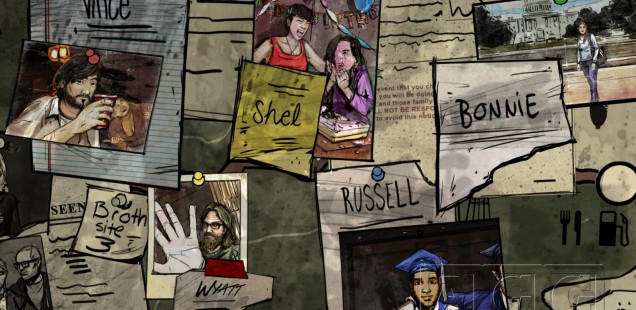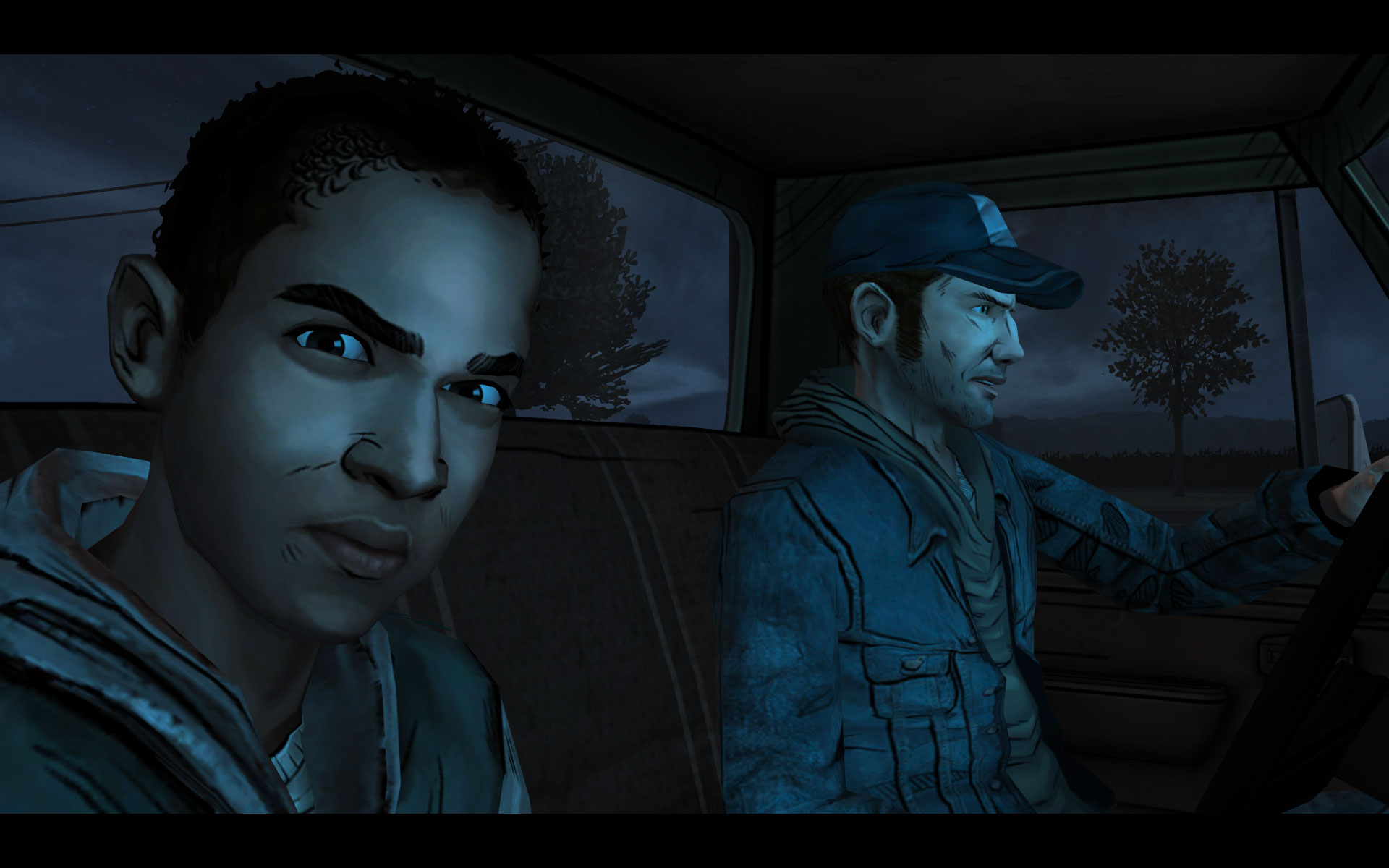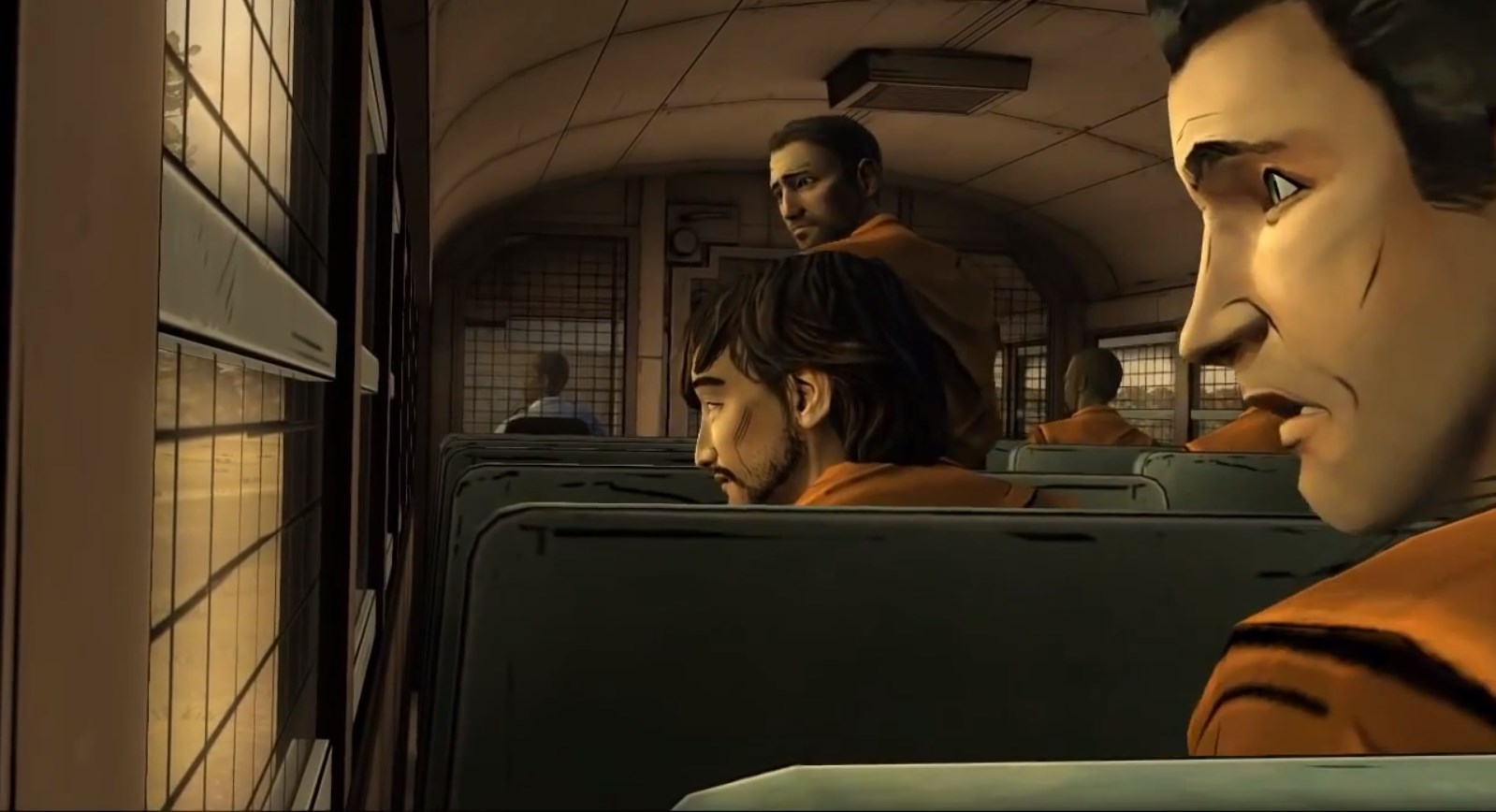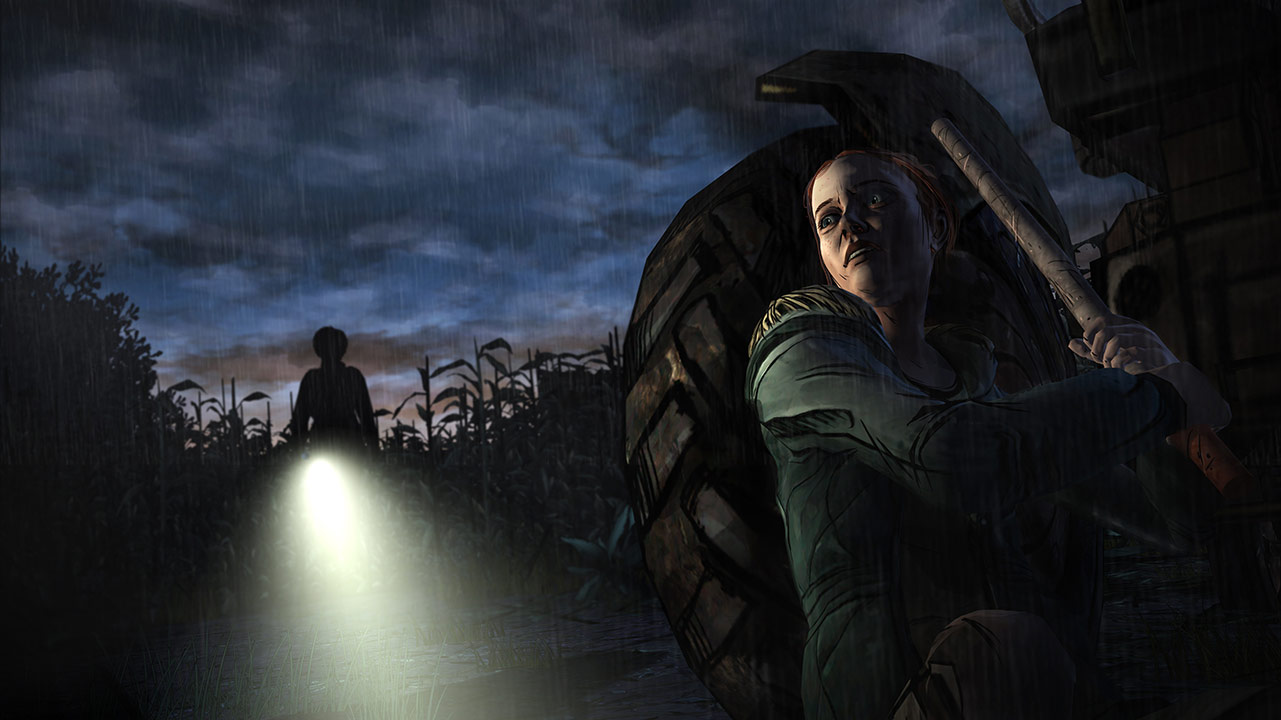
Wasted Days
Andrew Huntly looks back on the first year of the apocalypse. With spoilers.
It’s hard to tell exactly what purpose 400 Days serves for the Walking Dead series. Telltale have described it as a ‘bridge’ from Season One to Season Two of the episodic narrative, but what that truly means is still up to speculation. At any rate, this bit of DLC returns us to zombie-infested America to cover a significantly longer period, a little over the first year since the outbreak, in a significantly reduced amount of time, the space of a single episode. Seeing how it is broken up into five different segments, covering five different perspectives, I feel the best way to tackle 400 Days is to examine those stories individually.
Day 2
This story stars Vince, recently convicted of murder and now onboard a prison bus stuck in traffic. The focus of this short is on the conversation between Vince and two other inmates, as it shifts from light character exposition to full blown zombie drama when the bus is eventually invaded by the reliably interruptive undead.
Telltale’s excellent writing is well at work here, but it begins a problematic trend that continues throughout the rest of the DLC. Vince and his fellow prisoners basically spout exposition for the first few minutes, giving the player a choice to participate and expunge their own soul. The issue is that, even with a very brief prologue, Vince is an enigma to us. We don’t know who he killed or why, and while his companions are voiced and scripted well enough to be relatively personable, they eventually serve as little more than guidebooks for the moral choice that closes the episode.
It doesn’t help matters that a negative comparison can be neatly drawn to the bravado cop car opening of Season One. At that point, Lee was as blank a character as Vince, but the conversation options presented to the player were about choosing a tone for the scene and nudging Lee’s identity in a certain direction. The conversation in the bus lacks that, and feels more like you’re expected to participate in a discussion of which you have no knowledge and perhaps even no interest.
Day 41
The issue of missing information is exacerbated in the second story as two friends, Wyatt and Eddie, escape from a shadowy figure in a pickup truck. This one takes place entirely inside their car and, once again, relies on storytelling through conversation. There’s a scarce, fleeting hint that Eddie has killed someone, but beyond that there is a failure to communicate information to the player. This makes it even more problematic when we’re asked to take a stance on Eddie’s actions, which seems impossible when we don’t know the full story. Did Eddie kill in self-defense? Was it in anger? Was it for food and shelter? I I was stumped for seconds by each conversation option, and not in the good way.
The decision that closes the story also confounds, if only for execution. It doesn’t really feel like a choice is being made, or even presented, and there’s a final moment between the two that is incredibly silly and completely kills the messy, hectic tone that had come before. It’s a slow, tiresome and actually quite random affair that doesn’t gel in a story that began with gunfights and car chases.
It’s a shame because the production values and characterization are actually very good. Wyatt and Eddie have some incredibly naturalistic voice acting, backed up by a script that underplays the gravitas of the situation, benefiting the naive protagonists. The cinematography, which has always been excellent in the series, feels appropriately cramped and confined and by the end we have two nicely fleshed out characters with potential for growth. It’s just a shame their introduction was so very poor to actually play through, harming the overall attachment.
Day 184
This might be my favorite story out of the five. We start with a young hitchhiker named Russell who’s picked up by the older Nate, a hillbilly truck driver who straddles the line between recklessly humorous and possibly psychotic. The first half is another conversation set piece, but Russell is a much less enigmatic character, and we find out quickly he’s devoted to finding his grandmother in a nearby city. His motivations are simple, but Nate’s mysterious and juvenile antics gives the player a great deal of choice in how they respond. Russell can either be sullen and decline to talk, or be encouraged by Nate’s liveliness and respond much more heartily. Because these are two characters meeting for the first time, there’s no impression we’re missing valuable information.
 The second section is much more action based and less successful, but the action beats have never been a series strong point. Still, there are some nice character moments in between the gunfire and running, with the player continuing to input their own feelings in a clear and meaningful way. The option is still given to either keep Russell resentful or to encourage a more supportive or even brotherly bond between the two.
The second section is much more action based and less successful, but the action beats have never been a series strong point. Still, there are some nice character moments in between the gunfire and running, with the player continuing to input their own feelings in a clear and meaningful way. The option is still given to either keep Russell resentful or to encourage a more supportive or even brotherly bond between the two.
When the final choice comes around, it does feel a little out of the place with the story as told so far. There is an underlying theme of allegiance and Russell’s eventual perception of Nate, but the big picture doesn’t capture that essence as well as it could. Coupled with a reveal that’s about as subtle as a wrench to the head, it’s not the strongest way to close. A better, more compact final decision would serve the story better, but overall it doesn’t mar what is an interesting slice of character interaction with some well balanced player input.
Day 220
Bonnie, a former drug addict, gets a little too close to the married Leland and while his wife, Dee, shows signs of suspicion. Once again, we have some great natural performances and script, though they are perhaps erring a little far on the side of ‘organic’. Much of the dialogue, while believable, is somewhat rote, using a lot of words to get simple ideas through. Watching a married couple bicker is no more exciting with the added element of interaction.
But it’s the second half, a stealth section in a cornfield, where things really fall apart here. To spoil the ludicrous final moments, Bonnie mistakes Leland’s wife for an attacker and strikes her in the head with a crowbar, killing her. Leland comes across the two and the player is asked to choose between lying and remaining truthful. Unfortunately, the entire scene is based on very artificial setup. Despite needing to stay hidden from the unknown pursuers herself, Leland’s wife approaches Bonnie with a blinding flashlight in her hands. And if the player refuses to react to this shadowy figure, she kills them without revealing her identity. The game forces your hand in a very awkward manner here.
Day 236
Day 236 is perhaps the most thematically interesting story in the group, but its writing can’t carry the ideas with much conviction. Shel is living in a diner with her sister Becca and some wizened faces from Season 1. There’s a great deal to enjoy in the dynamics of this group, and the overly familiar choices of the episode are given much more poignancy by the way characters bounce off one another.
The more problematic aspects of the writing are twofold, and rather subtle. The first is with Becca, and it’s a problem Telltale may have created for themselves with Clementine. While by many standards Becca is well constructed, she embodies the grating, bratty archetype of child characters. She’s mostly unpleasant to talk to and lacks the rich empathy and characteristic fondness that made Clem such a fantastic character. She also carries similar thematic baggage to her younger counterpart, but it’s no way near as well executed. Shel has several on the nose conversations about protecting Becca from the horrors of the zombie-infested world, and discovering she has failed to do so.
But like I said, there is some thematically interesting material here. The story brings up themes of punishment and retribution, and even if they’re not developed with any particular grandeur, it’s still good to see threads emerge that could cohesively link into the second season. I do end up feeling overall disappointed in Day 236 though, simply because the twenty minute running time squishes and squeezes interesting material, with characters doing and saying things with little justification and ideas rushed inorganically. A sudden line about a puppy early in the episode feels especially clunky, not drawing from or adding to anything in particular.. The short running time reduces interesting ideas to pebbles skirting over a much deeper lake.
And that is the core issue of the entire DLC – a lack of time. Season One was episodic, but it carried so much through from episode to episode. Not just the accumulation of your narrative choices, but what they meant in the grand scheme of things. The friendships felt so fragile and real because they were given such a long time to develop and eventually strain, and characters felt authentic and potent because they were introduced to us slowly and their arcs were gradually laid out. All the time we had Lee and Clementine as anchors, our guides through the lives of people with all sorts of issues and complexities.
The snapshots of past lives and distant dreams we’re presented with here are too minute and even trite. I never felt the characters had room to breathe or to show me their actual identity, which wasn’t helped by the clumsily handled interaction. Almost every story feels like walking in on the middle of a someone elses drama, and you’re then expected to make decisions and have feelings about everything laid out before you. Even though Telltale’s dialogue standard is still high and they recruit fine voice talent, it doesn’t cover these core pacing issues.
In the epilogue, the narratives of all the characters are tied up, perhaps too neatly. There’s a clear throughline that will lead us into the second season, but if this was Telltale’s plan to introduce us to a new cast then it was not a hugely successful attempt. Staring at a missing person’s board, examining the photos of happy people living different lives, I know nothing about them other than they existed, and they might continue to exist somewhere out there in the barren, zombie filled wasteland.
And that’s an empty feeling if there ever was one.
Andrew Huntly’s cinematic rants have been complimented on British radio shows and their associated podcasts.

